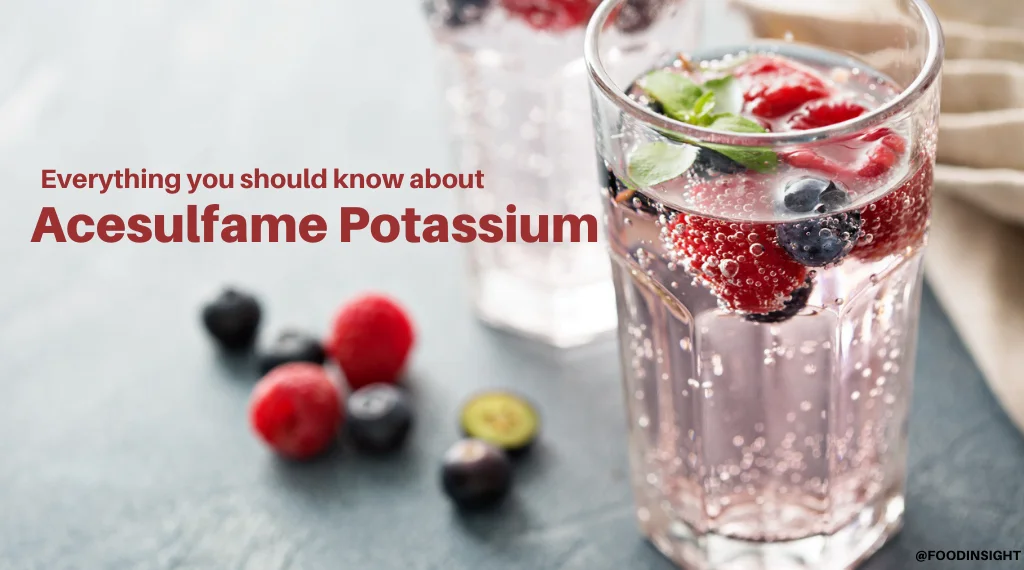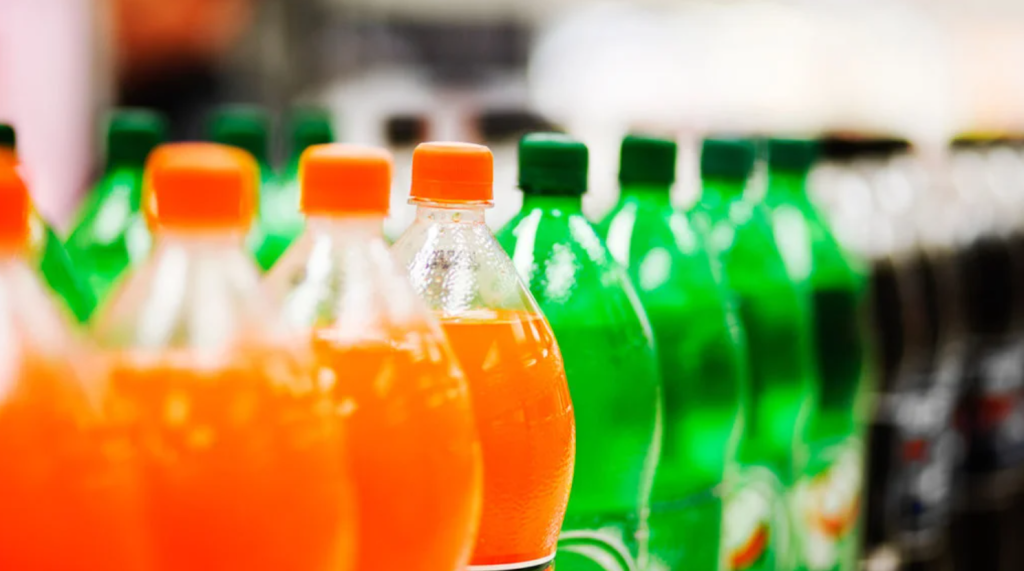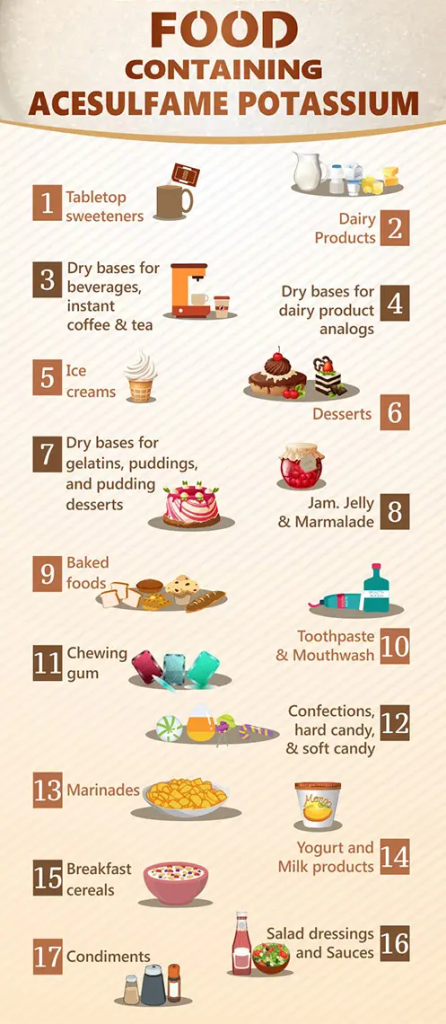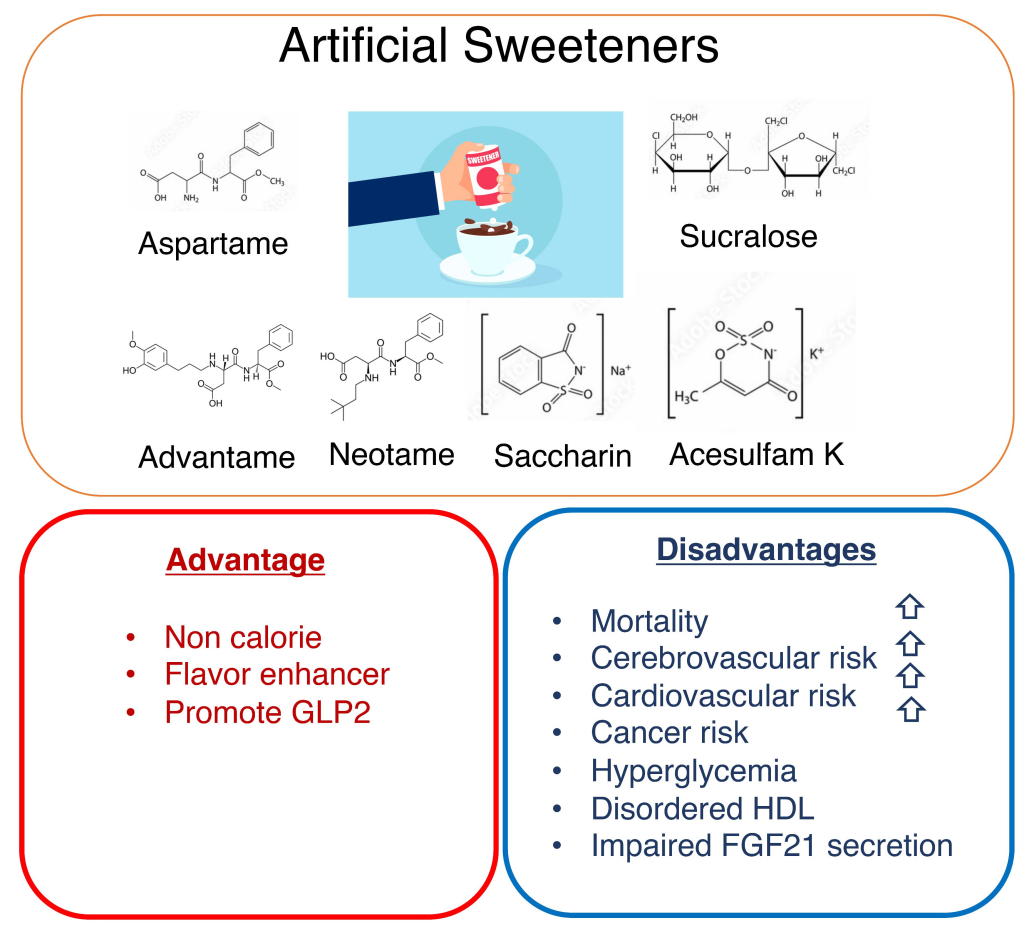What’s Acesulfame Potassium ?

Acesulfame potassium — also known as acesulfame K, or ace K — is an artificial sweetener. In Europe, people may refer to it as E950. Manufacturers sell acesulfame potassium under the brand names Sweet One and Sunet.
Acesulfame is around 200 timesTrusted Source sweeter than sugar. It stimulates the sweet-taste receptors on the tongue, so a person can enjoy the taste of sweetness without consuming sugar.
Manufacturers may blend acesulfame potassium with other sweeteners such as aspartame and sucralose to mask the bitter aftertaste it can have on its own.
The body may not fully break down or store artificial sweeteners as it does with other food. Instead, the body absorbs it and then passes it, unchanged, through urine.
Which foods contain acesulfame potassium?

Acesulfame potassium is a highly versatile artificial sweetener that manufacturers use in a wide range of foods and drinks.
Unlike similar sweeteners, such as aspartame, it is heat stableTrusted Source. This means it is suitable for baked goods.
Examples of foods that may acesulfame potassium include:

- beverages, including soda, fruit juices, non-carbonated drinks, and alcohol
- tabletop sweeteners
- dairy products
- ice cream
- desserts
- jam, jelly, and marmalade
- baked goods
- chewing gum
- syrups
- condiments
Effects on blood sugar and insulin
According to a 2024 review, diabetes and artificial sweeteners have a complex and nuanced relationship.
A major benefit of artificial sweeteners is their potential to aid weight management, which can reduce the risk of type 2 diabetes. These sweeteners also do not typically affect immediate blood sugar levels, which may help people with diabetes manage their blood sugar.
However, research in the review links artificial sweeteners with risk factors for metabolic syndrome, which can increase a person’s risk of type 2 diabetes.
The review also states that research on artificial sweeteners and blood sugar regulation or type 2 diabetes risk have conflicting results.
For example, artificial sweeteners may help to protect against the inflammation and problems with insulin signaling involved in insulin resistance.
However, one study in the review found that people with type 2 diabetes who consumed artificial sweeteners had greater insulin resistance than those who did not.
Overall, more research is necessary to fully understand the associations between artificial sweeteners, blood sugar, and insulin.
People with diabetes should speak with their healthcare team if they have concerns or questions about how artificial sweeteners may affect their condition.
How much acesulfame potassium is safe to consume?
The FDA sets an Acceptable Daily Intake (ADI) level for many food ingredients that it permits for use in foods and beverages. The ADI is the average daily intake over a lifetime that is expected to be safe based on significant research. It is derived by determining the no-observed-adverse-effect-level, or NOAEL, which is the highest intake level found to have no adverse effects in lifetime studies in animal models. The NOAEL is then typically divided by 100. Setting the ADI 100 times lower than the upper level found to have no adverse effects in toxicology studies adds a margin of safety that helps to ensure that human intakes will be safe.
The EFSA recognizes an ADI of 0–9 milligrams (mg) per kilogram (kg) of body weight per day for acesulfame potassium. The FDA and JECFA have each established an ADI of 0–15 mg/kg of body weight per day. Using the FDA ADI for acesulfame potassium, a person weighing 150 pounds (68 kg) would exceed the ADI if consuming more than 26 individual tabletop packets of a sweetener that contains acesulfame potassium every day over the course of their lifetime.
While precise measurements of total acesulfame potassium intake in the U.S. are limited, 1.8 mg/kg of body weight per day from beverages among U.S. adults is a conservative mean estimate of acesulfame potassium intake that has recently been reported. This level of intake is well below the FDA ADI. Globally, estimated acesulfame potassium intake from foods and beverages also remains well below the EFSA and JECFA ADIs. A 2018 scientific review found that studies conducted since 2008 raise no concerns for exceeding the ADI of the major low- and no-calorie sweeteners—including acesulfame potassium—in the general population.
Can Acesulfame potassium cause cancer?
When concerns about the possibility of low-calorie sweeteners causing cancer surfaced in the early 1970s, the news gained the attention of governments, scientists, and the general public. Initial studies suggested that saccharin caused bladder cancer in male rats and might similarly affect humans. Through subsequent research, however, it was determined that saccharin does not cause cancer in humans. The biological mechanisms responsible for the development of cancer from saccharin consumption are specific to rats and do not apply to humans.
Since that time, scientists have continued to study potential associations between low-calorie sweeteners and cancer. A few studies over the decades have claimed to demonstrate that some types of low-calorie sweeteners cause cancer, prompting extensive reviews of the methods used to support such conclusions. Independent government and expert evaluations have repeatedly found these studies to be significantly flawed and not of the caliber to be considered in official safety assessments. Government agencies base their safety evaluations on the highest-quality scientific studies, and these studies have consistently shown that consuming low-calorie sweeteners does not cause cancer, nor does it increase the risk of developing cancer.
For more information about research on low-calorie sweeteners and cancer, visit the American Cancer Society and the National Cancer Institute.
What’s the bottom line?
Acesulfame potassium has been FDA-approved as a food additive for more than three decades, and its safety has been repeatedly acknowledged by many international health authorities. All types of foods and beverages, including those made with acesulfame potassium, can have a place in a variety of healthy eating patterns. Choosing foods and beverages sweetened with low- and no-calorie sweeteners such as acesulfame potassium is one way to reduce consumption of added sugars and keep calories in check—both are important components in maintaining good health.


